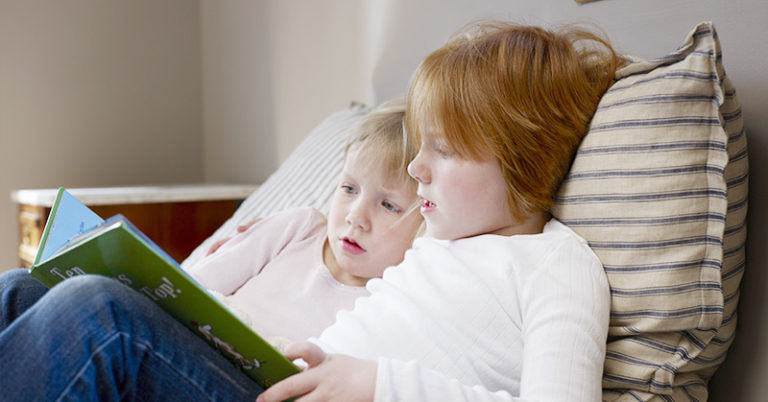Managing screen time for kids is a challenge that didn’t exist when many parents were young. Sure, they had may have had TVs and computers, but now it’s not uncommon for each family member to own their own personal device (or multiple). The days of having to compromise over what to watch on TV or who gets the computer next are over. Now is the era of “screen babysitters”.
One mom noticed that too much screen exposure was creating a negative effect on her kids. So she pulled the plug on screen time — literally.
From Screens to Books
Blogger Molly DeFrank had come across many articles explaining how excessive screen time can be unhealthy for children. She was also seeing that effect firsthand with her own kids, even though they were only allowed one to two hours of screen time a day.
“When screens were part of daily life, we saw tantrums and short attention spans and just the kind of disastrous behavior every mom hates,” she wrote in a recent Facebook post. “We suspected the screens could have been to blame, mainly because when it was time to hand over the iPad—whoa nelly.”
About 18 months ago, we put our kids on a total digital detox. It changed everything. My kids are the coolest…but…
Posted by Molly DeFrank on Monday, September 14, 2020
When she came home one day after running errands, a child greeted her with a “can I play on your phone?” She realized she was facing, in her words, “an adorable screen zombie”. It was a tough realization.
So she decided to limit their screens — all of them — for two weeks. This included iPads, Nintendo Switch, XBox, etc. Then she braced herself for the storm of anger that turned out to be shorter than expected. Then a slew of positive changes rolled in.
“I got my kids back,” she wrote. “They got their childhood back.”
A few Saturdays into the detox, the kids found their parents reading in bed. One by one, they grabbed their own books and joined them.
After the Screen Detox
When the two weeks were over, things were going so well, the “detox” continued. It was hard to believe the impact of only one to two hours a day of screen time on their children’s minds and attitudes.
“I watched my kids go from screen-dependent to cooperatively playing, creating and even making their own “school.” I couldn’t believe how easy it was.” [1]
A year and a half later, her kids ravenously consume books, teach karate to younger siblings, build forts, write stories, collect rocks, catch lizards, play cards, and invent jokes. Although they had done some of this before, it’s incomparable to their playing now.
“Pre-detox, they didn’t have to troubleshoot their boredom,” DeFrank explained. “There was always some kind of electronic entertainment available to do the work for them. But now, their creativity has exploded. They play more collaboratively, more creatively and for longer.
Of course, kids still have their fights, but nowhere near the intensity of the pre-detox era.
“Months after we started, my older kids even thanked us for pulling the plug.”
DeFrank encourages her followers to also try a screen detox. She admits that technology is useful but not when it’s at the detriment of her children. She encourages her followers to also try a technology overhaul. Although distance learning has disrupted their plan to limit screen time, she emphasizes that “now is a better time than ever to give your kids a break from screen entertainment.” [2]
The Science Behind the Effects of Screen Time on Children
A recent study published in the JAMA Pediatrics journal discovered that among their 47 participants, ages three to five, those with increased exposure to screen-based media were found to have lower amounts of development in that area of the brain that supports executive functions and literacy skills. [3]
“This is the first study to document associations between higher screen use and lower measures of brain structure and skills in preschool-aged kids,” said lead author Dr. John Hutton, a pediatrician and clinical researcher at Cincinnati Children’s Hospital. “This is important because the brain is developing the most rapidly in the first five years. That’s when brains are very plastic and soaking up everything, forming these strong connections that last for life.” [4]
More research is needed about the association between the developing brain and screen-based media to develop these findings. Studies like these are vital in this modern age, where the technology changes so rapidly parents are raising children in a world vastly different than the one they grew up in.
Until more research is conducted, it’s best to play on the safe side when it comes to children and technology. Take a leaf from Molly DeFrank’s books and analyze your children and their relationship to screens, and determine whether it could be improved.
“The number one recommendation that we give to parents is [to] spend time engaged with their kids,” says Lasser Jon Lasser, PhD, a psychologist at Texas State University and co-author, with Mike Brooks, PhD, of the 2018 book “Tech Generation: Raising Balanced Kids in a Hyper-Connected World.”. “It’s simple, it’s good parenting and it promotes a healthy relationship.” [5]
Keep Reading: Giving Your Child a Smartphone Is “Like Giving Them Drugs,” Says Top Addiction Expert
- ‘Facebook Post’ Facebook Molly DeFrank. Published November 7, 2019
- ‘Facebook Post’ Facebook Molly DeFrank. Published September 14, 2020
- ‘Associations Between Screen-Based Media Use and Brain White Matter Integrity in Preschool-Aged Children.’ JAMA Pediatrics John S. Hutton, MS, MD1,2; Jonathan Dudley, PhD2,3; Tzipi Horowitz-Kraus, PhD. Published November 4, 2019
- ‘Mom Notices Drastic Effects 7 Months After Pulling the Plug on Screen Time for Her Kids.’ Tip Hero.
- ‘What do we really know about kids and screens?’ American Psychological Association Stephanie Pappas. Published April 1, 2020

